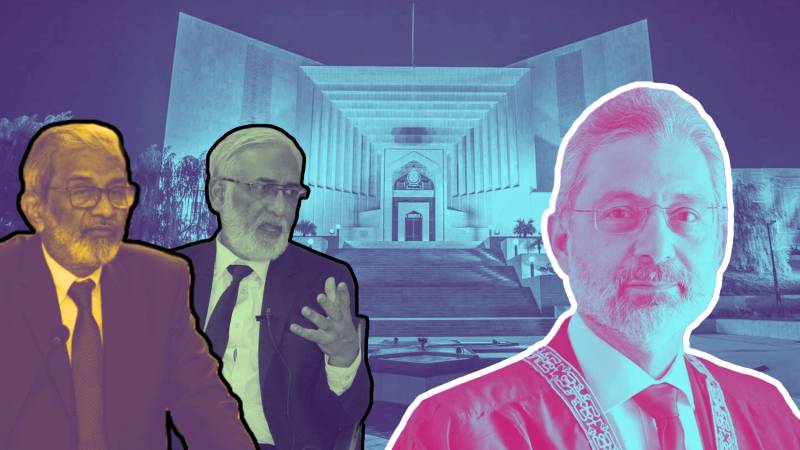
After Justice (retired) Mushir Alam, another retired judge of the Supreme Court, Justice (retired)) Maqbool Baqar has also refused to serve as ad hoc judge of the Supreme Court following severe criticism on social media by Pakistan Tehreek-e-Insaf (PTI).
The Judicial Commission of Pakistan (JCP), chaired by Chief Justice of Pakistan Qazi Faez Isa, is scheduled to meet on Friday to consider the appointment of four retired judges of the apex court on an ad hoc basis to tackle the growing caseload in the top court. However, the top court still has a few formal seats which have yet to be filled.
Last week, the names of four retired judges of the top court surfaced as being proposed for the ad hoc positions. These included Justice (r) Mazhar Alam Miankhel, Justice (r) Sardar Tariq Masood, Justice (r) Mushir Alam, and Justice (r) Maqbool Baqar. Of these, Justice Miankhel and Justice Masood had expressed their willingness to take up the positions. Justice Alam, however, had written to the chief justice informing him of his decision not to take up the position.
Legality of ad hoc judges and history
Article 182 of the Constitution says, "If at any time it is not possible for want of quorum of Judges of the Supreme Court to hold or continue any sitting of the Court, or for any other reason it is necessary to increase temporarily the number of Judges of the Supreme Court, the Chief Justice of Pakistan 2 [in Consultation with the Judicial Commission as provided in clause (2) of Article 175A] may, in writing,— (a) with the approval of the President, request any person who has held the office of a judge of that court and since whose ceasing to hold that office three years have not elapsed; or (b) with the approval of the President and with the consent of the chief justice of a high court, require a Judge of that Court qualified for appointment as a judge of the Supreme Court, to attend sittings of the Supreme Court as an ad hoc Judge for such period as may be necessary and while so attending an ad hoc Judge shall have the same power and jurisdiction as a Judge of the Supreme Court."
So far, 22 retired judges have served as ad hoc judges in the top court from 1955 to 2016.
The federal government believes the need exists for additional judges to help clear the massive backlog of pending cases.
Opposition
The PTI has termed the move as "dishonesty", claiming that it could be a ploy to force the reversal of the majority verdict issued by eight judges in the reserved seats case, compared to the minority judgement of five judges.
Legal experts, however, believe that although a 13-judge bench heard the reserved seats case, it was considered a full court because only 13 judges were available. Justice Musarrat Hilali did not participate in the case because she is currently unwell and unable to attend hearings. They claim that if a review petition of any aggrieved party is fixed for hearing, it must be heard by a full court comprising 20 or more available judges.
Is PBC united on this matter?
In initial reactions to the chief justice's decision to appoint four ad hoc judges to the top court, seven members of the Pakistan Bar Council (PBC) expressed concern, stating that it could be seen as an attempt to 'pack the court' and undermine the judiciary's independence.
The seven PBC members stated that Justice (retired) Mushir Alam had already declined the offer in his letter dated July 13. They commended his decision to refuse the offer, highlighting his awareness of the potential implications of accepting such an appointment. They also called upon the other former judges to decline the appointments.
However, on Thursday, the Pakistan Bar Council issued a statement claiming that its members from Punjab and Khyber Pakhtunkhwa suggested appointing ad hoc judges on an interim basis.
The statement read that PBC members from Punjab and Khyber Pakhtunkhwa had met with CJP Isa and complained that the political cases take too much time of the top court. As a result, other cases of varying nature by ordinary citizens get pushed back. They also demanded that dedicated benches be established to tackle cases in the provincial registries. They suggested that CJP Isa could appoint recently retired top court judges under Article 182 (Sections A and b) of the Constitution.
Accepting the suggestion, CJP Isa summoned a meeting of the Judicial Commission of Pakistan (JCP) on Friday, July 19.
The PBC hailed the move, noting that a constitutional provision exists for it. The PBC further urged the federal government to amend the Constitution to form a constitutional court dedicated to deciding constitutional and political cases.

